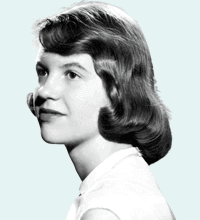Sylvia Plath was born on October 27, 1932, in Boston, Massachusetts, to Otto and Aurelia Plath. Her father, Otto, was a German immigrant and a professor of biology specializing in bees, while her mother, Aurelia, was of Austrian descent. Sylvia’s early life was marked by both joy and tragedy. Her father’s early death in 1940, when she was just eight years old, had a profound impact on her, shaping much of her later work.
“Poetry at its best can do you a lot of harm.” – Sylvia Plath (1932-1963)

Sylvia displayed a exceptional talent for writing from a young age, publishing her first poem at eight. Her early poetry often reflected the pleasant and completely contrasting moments of her childhood. Plath’s brilliance was evident in her academic achievements as well. She attended Smith College on a scholarship, where she continued to excel in her studies and her literary pursuits.
Education and Early Writing
At Smith College, Sylvia Plath was known not only for her academic excellence but also for her emotional intensity. She wrote for the college newspaper and published poems and short stories in various magazines. Her junior year was marked by a significant event: an internship at Mademoiselle magazine in New York City. This experience, while glamorous, was also deeply unsettling for Plath and later became the basis for her novel The Bell Jar.
After her return from New York, Sylvia experienced her first major depressive episode, leading to a suicide attempt in August 1953. She recovered and returned to Smith, graduating summa cum laude in 1955. She then earned a Fulbright Scholarship to study at Newnham College, Cambridge, where she continued to write prolifically.
Personal Life and Marriage to Ted Hughes
While studying at Newnham College, Cambridge, Sylvia Plath met the English poet Ted Hughes at a party in February 1956. Their meeting was exciting and passionate, setting the tone for their intense relationship. They married on June 16, 1956, just a few months after their first meeting. Their marriage was both a creative partnership and a source of personal instability.
The couple settled in the United States for a while, where Sylvia taught at Smith College. However, they eventually returned to England, living in various locations, including London and Devon. Their relationship involved both creative collaboration and mutual influence, but it was also troubled by Ted’s infidelities and Sylvia’s ongoing struggles with mental illness.
They had two children, Frieda (born 1960) and Nicholas (born 1962). Sylvia’s joy in motherhood was often overshadowed by the strains in her marriage and her recurring episodes of depression.
Literary Career
Sylvia Plath’s literary career was marked by both early promise and posthumous success. Her first poetry collection, The Colossus, was published in 1960. The poems in this collection are exactly crafted and explore themes of identity, loss, and nature. While The Colossus was well-received, it did not immediately shoot her to fame.
Ariel and Later Works
It was the posthumously published collection, Ariel (1965), that established Sylvia Plath as a major literary figure. The poems in Ariel are intensely personal and often dark, reflecting her inner turmoil and struggles. Notable poems include “Daddy,” “Lady Lazarus,” and “Tulips.” These works are characterized by vivid imagery, emotional intensity, and technical brilliance. Ariel is considered one of the most important poetry collections of the 20th century.
In addition to her poetry, Plath wrote an autobiographical novel, The Bell Jar which was published under the pseudonym Victoria Lucas in 1963, the novel is a semi-autobiographical account of her inclination into mental illness. The protagonist, Esther Greenwood, struggles with societal expectations and her own sense of identity. The novel provides a disturbing and insightful portrayal of mental illness and the pressures faced by women in the 1950s.
Struggles with Mental Health
Sylvia Plath’s struggles with mental health constantly throughout her life. She experienced several severe depressive episodes and was hospitalized multiple times. Her writing often reflects her inner conflicts of pain and confusion.
The winter of 1962-1963 was particularly difficult for Plath. Separated from Ted Hughes, she moved with her children to a flat in London. Despite her deteriorating mental state, she continued to write frequently, producing some of her most acclaimed work during this period.
Tragic End
On February 11, 1963, at the age of 30, Sylvia Plath took her own life. She carefully sealed the rooms between herself and her sleeping children before turning on the gas oven. Her death was a tragic and premature end to a life of immense talent and potential.
Plath’s Legacy in American Literature
Sylvia Plath’s legacy in American literature is great and profound influencing countless writers and readers. Sylvia Plath is often associated with the confessional poetry movement, which started in the mid 20th century. As a subject matter of the works, confessional poetry is characterized by the poet’s use of personal painful experiences. Plath exploration of her struggles with mental illness set a model for confessional poetry. Her poetry paved the way for other poets, such as Anne Sexton and Robert Lowell.
Plath’s writing has been celebrated for its feminist themes as she explored on woman’s struggle and the state of mind. Her works of art have inspired many scholars and remain relevant till date. She portrays women and mothers exploring their identity, mental illness and the universal experience cum emotions. Plath ability to express and explore her inner thoughts with such clarity and intensity in her poems ensures her legacy will remain for many generations. Her poems and novel, The Bell Jar, address the pressures faced by women as the traditional roles of wife and mother. Plath’s work has inspired feminist literary criticism and remains a touchstone for discussions about gender and identity.
Plath’s influence reaches to a wide range of contemporary writers and poets. Her new way of using imagery, language, and form has influenced many literary artists to follow her. Writers such as Sharon Olds, Adrienne Rich, and Margaret Atwood have cited Plath as an influential figure in their literary works. Plath’s ability to combine personal experience with universal themes has made her a model for many poets.

